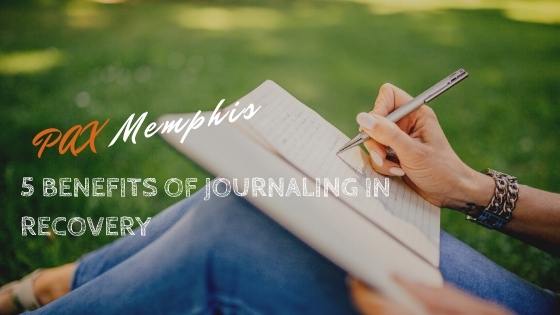Journaling in recovery can be an extremely powerful tool in the healing process. While there are many different types of journals you can keep, all methods can benefit your sobriety.
As a form of expressive writing, the goal is not to sound nice, make words flow perfectly, or even tell a story that makes sense. Instead, the goal of journaling is to help you process your thoughts and feelings in a way that allows you to better understand yourself and cope with your circumstances.
Here are 5 reasons you should incorporate journaling into your recovery.
1. Journaling Can Help You Identify and Cope With Triggers in Recovery
Journaling is all about reflection. Whether you are journaling about your day, are writing down your thoughts, or are cultivating a daily gratitude journal, journaling in recovery will allow you to identify patterns in your life – both good and bad – and help you realize which coping methods worked for you and which did not.
At the end of a hectic and bad day, it can be difficult to pinpoint exactly what it was that pushed you over the edge. However, by putting pen to paper and re-reading your stream of thoughts, you can begin to make sense of your day, your emotions, or your thoughts, which will allow you to see your strengths, weaknesses, and triggers.[1]
In the end, journaling is all about reflection and self-discovery. And in that, you will learn to cope with difficult times and move past obstacles without picking up a drink or a drug.
2. Journaling Will Shed Light on Any Negative or Self-Defeating Thoughts
At the end of a bad day, it can be easy to get caught up in negative or self-destructive thoughts. If you don’t have a healthy way to process these thoughts, you may begin to internalize them. Examples of common self-defeating thoughts in recovery include:
- “They’ll never trust me again.”
- “I don’t deserve to be sober.”
- “I’ll never be able to stay sober.”
Your inner dialogue can affect your mental health immensely. By writing these negative thoughts down, you can begin to examine your own critiques and realize just how poorly you treat yourself. Realizing this is the first step towards beginning to treat yourself with the love, dignity, and forgiveness you deserve.
In doing this, you will gain self-confidence and a clearer state of mind. You’ll also feel more assured at taking on new obligations and being a sober individual.
3. Self-Reflection Will Help Keep Your Recovery In Check
Journaling in recovery will allow you to get more in touch with your feelings and your personal needs. After journaling for a while, you will begin to notice patterns and become more self-aware. This is beneficial because it can allow you to hold yourself accountable and keep your recovery in check.
When you are self-aware, you will recognize when you are letting your recovery fall to the wayside. You will also be more likely to recognize when you need to reach out to ask for extra help. Keeping a journal can help you accomplish these things and provide you with an outlet to express yourself freely.
4. Journaling Can Help You Cope With Anxiety and Stress in Recovery
When anxiety or stress hit you late at night, it can be difficult to relax your mind and fall asleep. Anxiety can cause your thoughts to move a million miles a minute and stress can make it difficult to sift through and make sense of all of these different thoughts. Rather than struggling with insomnia due to anxiety and stress, try picking up a journal and jotting down your thoughts.
Journaling your racing thoughts will help you see which ones are real, which ones are irrational. It will also help you make sense of your anxious thoughts so you can focus on what is most important. After journaling, you may find that your anxiety and stress have gone away. This may allow you to sleep better, have more energy throughout the day, and be more focused when working on tasks.[2]
5. Journaling Can Benefit Your Mental Health and Help Prevent Relapse
Keeping a journal is like having a safe space for you to divulge your innermost thoughts, feelings, and struggles. It simply feels good to get all of these things down on paper rather than holding them inside. And, writing down your feelings and struggles is a coping mechanism. It is an extremely healthy way to voice and sort through your emotions.
According to the University of Rochester Medical Center, journaling can help manage anxiety, reduce stress, cope with depression, and more.[3] In addition to helping you process these difficult emotions, journaling can help you become aware of your emotions so that you are better equipped to cope with them.
Moreover, the more you are in tune with your emotions and equipped with coping mechanisms, the less likely you are to relapse. As a result, journaling can be a major relapse prevention tool in recovery.
Start Your Recovery Journey Today
Whether you’ve already gotten sober and need a little extra support or you are just now beginning your recovery journey, our team at PAX Memphis Recovery Center is here to help. With various levels of care, individualized treatment, and decades of experience in treating addiction, we can help you get the life you want. Don’t wait any longer. Call now for help with addiction.
References:
Medically Reviewed: September 25, 2019

All of the information on this page has been reviewed and verified by a certified addiction professional.










